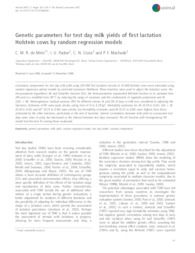Genetic parameters for test day milk yields of first lactation Holstein cows by random regression models.
Genetic parameters for test day milk yields of first lactation Holstein cows by random regression models.
Author(s): MELO, C. M. R. de; PACKER, I. U.; COSTA, C. N.; MACHADO, P. F.
Summary: Covariance components for test day milk yield using 263 390 first lactation records of 32 448 Holstein cows were estimated using random regression animal models by restricted maximum likelihood. Three functions were used to adjust the lactation curve: the five-parameter logarithmic Ali and Schaeffer function (AS), the three-parameter exponential Wilmink function in its standard form (W) and in a modified form (W*), by reducing the range of covariate, and the combination of Legendre polynomial and W (LEG+W). Heterogeneous residual variance (RV) for different classes (4 and 29) of days in milk was considered in adjusting the functions. Estimates of RV were quite similar, rating from 4.15 to 5.29 kg2. Heritability estimates for AS (0.29 to 0.42), LEG+W (0.28 to 0.42) and W* (0.33 to 0.40) were similar, but heritability estimates used W (0.25 to 0.65) were highest than those estimated by the other functions, particularly at the end of lactation. Genetic correlations between milk yield on consecutive test days were close to unity, but decreased as the interval between test days increased. The AS function with homogeneous RV model had the best fit among those evaluated.
Publication year: 2007
Types of publication: Journal article
Unit: Embrapa Dairy Cattle
Observation
Some of Embrapa's publications are published as ePub files. To read them, use or download one of the following free software options to your computer or mobile device. Android: Google Play Books; IOS: iBooks; Windows and Linux: Calibre.
Access other publications
Access the Agricultural Research Database (BDPA) to consult Embrapa's full library collection and records.
Visit Embrapa Bookstore to purchase books and other publications sold by Embrapa.

